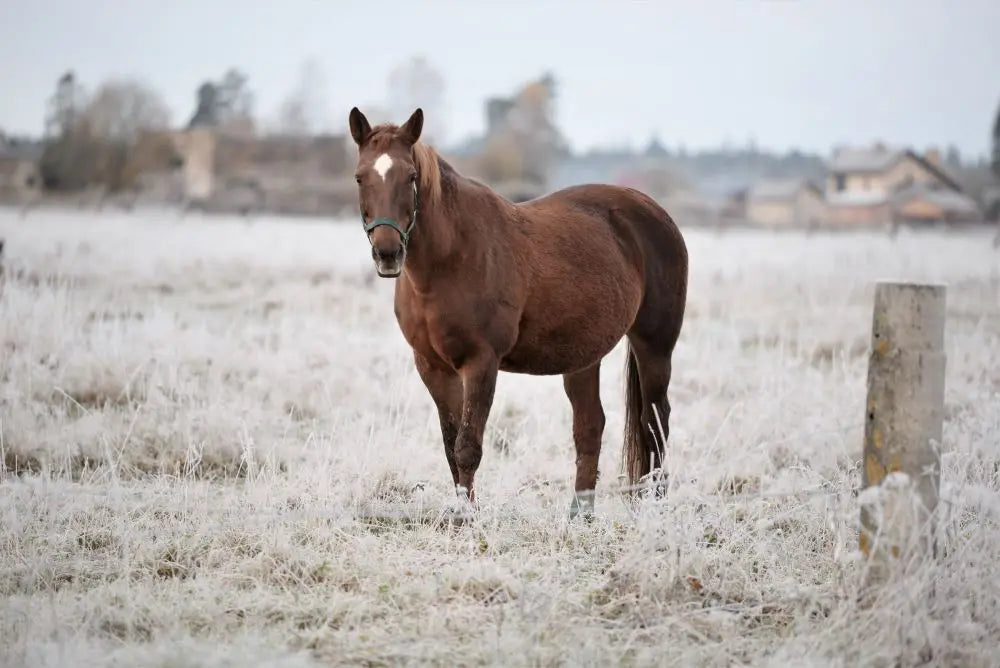From £6.99

Winter Horse Care: Adjusting Routines and Diet
Introduction to Caring for Horses in Winter
As wintry weather envelops the UK, the care routines for horses inevitably undergo adjustments. The drop in temperature, coupled with wet and muddy conditions, requires horse owners to rethink the daily management of their animals. Horses spend more time indoors, and their natural habits, particularly grazing, are affected. These changes can lead to various health challenges that need to be addressed to ensure the well-being of horses throughout the season. From digestive health to respiratory care, understanding how to adapt their routines and diets is crucial.
The reduction in grazing time can result in a lack of fibre, essential for maintaining healthy digestion. Moreover, horses often drink less water in cooler weather, increasing the risk of dehydration. Alongside these nutritional concerns, the extra time spent indoors exposes horses to potential respiratory issues. Poor ventilation and dust accumulation from hay or bedding can irritate the respiratory system, causing coughing or allergic reactions. Therefore, adjusting both diet and stable environment to suit the season is paramount in maintaining the health and comfort of horses during winter.
Modifying Routines and Grazing Habits
During winter, the hours of daylight diminish, significantly reducing grazing time. Horses, who typically enjoy extended periods munching on grass, may lack adequate fibre intake, which is vital for their digestive health. This reduction can lead to issues like colic or decreased hindgut motility. To counteract these problems, it’s important to ensure horses receive a consistent intake of fibre through alternative means. Incorporating high-fibre feeds into their diet can help replicate the natural grazing process, thereby maintaining a healthy digestive system.
Nutritional Changes for the Winter Months
With the decrease in natural grazing, it becomes essential to introduce alternative sources of fibre. High-fibre feeds and hay replacers come into play as suitable options. Products like Pure Meadow Mash offer not just a source of fibre but also contribute to hydration when soaked. These feeds are palatable and can encourage horses to consume more water. The emphasis on fibre not only aids digestion but also helps prevent complications related to inadequate fibre intake. Switching to dust-free alternatives also ensures that horses, especially those sensitive to dust, have fewer respiratory issues.
Ensuring Adequate Water Consumption
Horses often reduce their water intake in colder weather, which can lead to dehydration and exacerbate digestive problems. Encouraging horses to drink enough water is vital during winter. Offering warm water can increase consumption, as many horses prefer it to cold. Additionally, adding a little salt to their feed can stimulate thirst. Regularly checking and breaking the ice in water troughs ensures that horses always have access to fresh water. Adequate hydration supports overall health and complements the dietary fibre adjustments made during this season.
Averting Respiratory Problems
The increased time horses spend indoors during winter raises the risk of respiratory problems. Poor ventilation and the accumulation of dust from hay or bedding can irritate the respiratory tract, causing issues like coughing or allergic reactions. To mitigate these risks, it's important to ensure stables are well-ventilated. Regularly cleaning and maintaining the stable environment to reduce dust build-up can significantly improve air quality. Using dust-free bedding and feeds can further reduce the chances of respiratory irritation. Keeping horses' respiratory systems healthy is essential for their comfort and overall well-being during the winter months.
Final Thoughts
Winter presents a unique set of challenges for horse care, but with thoughtful adjustments, these can be effectively managed. Paying attention to the changes in weather and how they impact your horse's routine is crucial. Incorporating high-fibre feeds into their diet not only ensures they receive the necessary nutrients but also supports their digestive health. Additionally, maintaining good stable hygiene and ventilation helps to protect against respiratory issues, which are more prevalent during the colder months.
Encouraging horses to stay hydrated is another essential aspect of winter care. Given that horses tend to drink less in cooler weather, steps like offering warm water and ensuring water sources are always accessible and ice-free can make a significant difference. These small changes can prevent dehydration and the associated health risks.
By making these adaptations to their routines and diet, horse owners can help ensure their animals remain healthy and comfortable throughout the winter. It’s important to stay vigilant, observing any changes in behaviour or health that may indicate an issue. Regular check-ups with a vet can also help in early detection and prevention of potential problems.
Overall, proactive and attentive care will ensure that horses can navigate the winter months without significant health issues. By focusing on their specific needs during this season, horse owners can provide the best possible care for their animals.
